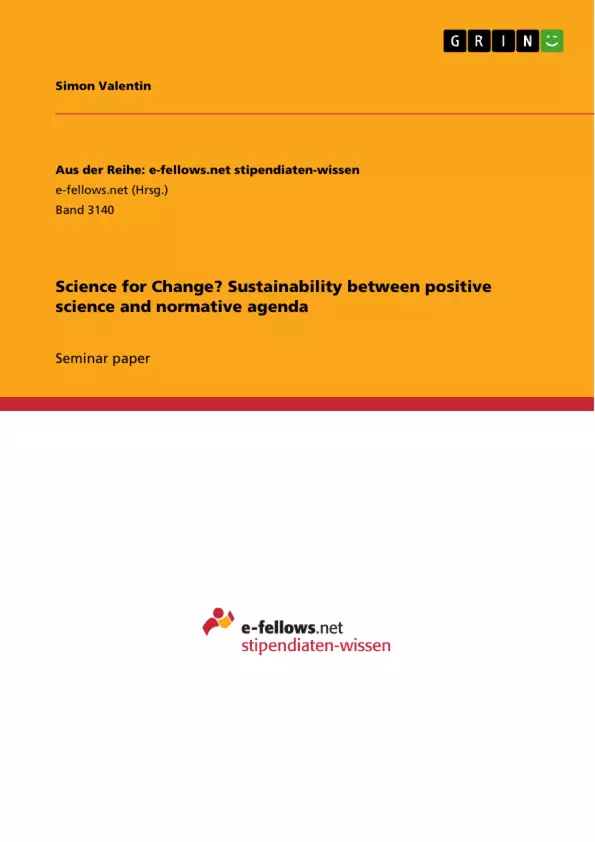In the last three decades, the notion of sustainability became, although it is not a new idea, one of the most used concepts in scientific, political, and societal debates. [...] Today, sustainability is used very diversely and to describe very different things, diluting the concept to a synonym for everything that is good and is used as a quasi-objective alternative to a subjective value judgment about what someone perceives as good or right. The term has been misused and abused, when companies such as ExxonMobil, Lockheed Martin or Philip Morris describe their oil, tobacco or weapons business as sustainable and McDonald’s Canada advertises sustainable beef (Károly, 2011). Nevertheless, it is used for the most ambitious human development ideas such as the Agenda 2030 of the United Nations. This ambiguity and vagueness is facilitated by the two-fold nature of the term, as a positive scientific concept and a normative vision for the future of humankind.
Inhaltsverzeichnis (Table of Contents)
- Introduction
- Sustainability and science
- Science and value-freedom
- Sustainability as positive science
Zielsetzung und Themenschwerpunkte (Objectives and Key Themes)
This paper aims to clarify the diverse meanings of sustainability by analyzing its role within both scientific and non-scientific contexts. Furthermore, it explores the potential and limitations of establishing a transformative sustainability science.
- The concept of sustainability and its evolution
- The relationship between science and value judgments
- The characteristics and potential of sustainability research as a driver for change
- The development of a transformative sustainability science
- The limits and possibilities of positive science in relation to sustainability
Zusammenfassung der Kapitel (Chapter Summaries)
The introduction presents the concept of sustainability as a widely used and often misused term, highlighting its dual nature as both a scientific concept and a normative vision. It discusses the increasing frequency of the term in scientific and non-scientific literature and its diverse applications, including both corporate greenwashing and ambitious human development initiatives like the UN's Agenda 2030.
The chapter on "Sustainability and Science" delves into the relationship between science and value judgments. It explores the concept of "positive science" or "descriptive science" and its emphasis on value-freedom, contrasting it with normative science. The chapter traces the history of value-freedom debates in philosophy, starting with David Hume's is-ought problem and highlighting key arguments from thinkers like Max Weber, Paul Feyerabend, and Hilary Putnam. It also discusses the limitations of value-freedom in applied sciences and social sciences, highlighting the inherent value-charged nature of research in fields like agricultural sciences.
The chapter on "Sustainability as Positive Science" introduces sustainability science as a young discipline concerned with the theory, research, and implementation of sustainable development. It examines the discipline's focus on understanding and finding solutions to complex challenges like climate change and biodiversity loss. The chapter also discusses the inherent challenges of addressing such complex issues from a purely positive science perspective, as determining solutions requires normative judgments beyond the scope of empirical science. It concludes by arguing that the emergence of sustainability research reflects the need for a methodical approach to bridging the gap between positive science and the normative demands of sustainability.
Schlüsselwörter (Keywords)
The paper focuses on the concepts of sustainability, science, value freedom, positive science, transformative sustainability science, sustainable development, and the limitations and possibilities of scientific approaches to complex social and environmental challenges.
Frequently Asked Questions
What is the "dual nature" of the term sustainability?
Sustainability acts as both a positive scientific concept (describing how systems work) and a normative vision (defining how the future should look).
What is "greenwashing" in the context of sustainability?
Greenwashing refers to the misuse of the term by companies (e.g., in the oil or tobacco industry) to describe their business as sustainable despite contradictory practices.
What is the "is-ought problem" mentioned in the text?
Derived from David Hume, it highlights the logical gap between descriptive statements (what is) and prescriptive statements (what ought to be), central to the debate on value-freedom in science.
What is transformative sustainability science?
It is a young discipline that goes beyond pure observation to actively research and implement solutions for sustainable development challenges like climate change.
Is science truly value-free?
The paper argues that while "positive science" strives for value-freedom, applied and social sciences are often inherently value-charged, especially when addressing complex societal goals.
- Quote paper
- Simon Valentin (Author), 2018, Science for Change? Sustainability between positive science and normative agenda, Munich, GRIN Verlag, https://www.grin.com/document/491911



